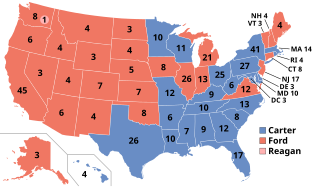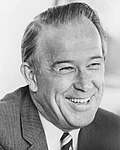
The 1976 United States presidential election was the 48th quadrennial presidential election, held on Tuesday, November 2, 1976. Democrat Jimmy Carter, former Governor of Georgia, defeated incumbent Republican president Gerald Ford in a narrow victory. This was the first presidential election since 1932 in which the incumbent was defeated, as well as the only Democratic victory of the six presidential elections between 1968 and 1988.

The 1988 United States Senate elections were elections for the United States Senate. Held on November 8, the 33 seats of Class 1 were contested in regular elections. In spite of the Republican victory by George H. W. Bush in the presidential election, the Democrats gained a net of one seat in the Senate. Seven seats changed parties, with four incumbents being defeated. The Democratic majority in the Senate increased by one to 55–to–45.

The 1984 United States Senate elections were held on November 6, with the 33 seats of Class 2 contested in regular elections. They coincided with the landslide re-election of President Ronald Reagan in the presidential election. In spite of the lopsided presidential race, Reagan's Republican Party suffered a net loss of two Senate seats to the Democrats, although it retained control of the Senate with a reduced 53-47 majority. Democrats defeated incumbents in Illinois and Iowa, and won an open seat in Tennessee, while Republicans defeated an incumbent in Kentucky.

The 1982 United States Senate elections were held on November 2, 1982. They were elections for the United States Senate following Republican gains in 1980. The 33 Senate seats of Class 1 were up for election in 1982. A total of four seats changed hands between parties, with Democrats winning seats in New Jersey and New Mexico, and Republicans taking seats in Nevada and the seat of the lone independent, Senator Harry Byrd Jr., in Virginia. Democrats made a net gain of one seat bringing them to 46 seats, while Republicans stayed at 54 seats for a majority. However, the Democratic gain in New Jersey replaced a Republican that had been appointed earlier in the year.

The 1974 United States Senate elections were held on November 4, with the 34 seats of Class 3 contested in regular elections. They occurred in the wake of the Watergate scandal, Richard M. Nixon's resignation from the presidency, and Gerald Ford's subsequent pardon of Nixon. Economic issues, specifically inflation and stagnation, were also a factor that contributed to Republican losses. As an immediate result of the November 1974 elections, Democrats made a net gain of three seats from the Republicans, as they defeated Republican incumbents in Colorado and Kentucky and picked up open seats in Florida and Vermont, while Republicans won the open seat in Nevada. Following the elections, at the beginning of the 94th U.S. Congress, the Democratic caucus controlled 60 seats, and the Republican caucus controlled 38 seats.

The 1964 United States Senate elections were held on November 3. The 33 seats of Class 1 were contested in regular elections. Special elections were also held to fill vacancies. They coincided with the election of President Lyndon B. Johnson by an overwhelming majority, to a full term. His Democratic Party picked up a net two seats from the Republicans. As of 2023, this was the last time either party has had a two-thirds majority in the Senate, which would have hypothetically allowed the Senate Democrats to override a veto, propose constitutional amendments, or convict and expel certain officials without any votes from Senate Republicans. In practice, however, internal divisions effectively prevented the Democrats from doing so. The Senate election cycle coincided with Democratic gains in the House in the same year.

The 1930 United States Senate elections occurred in the middle of Republican President Herbert Hoover's term. The 32 seats of Class 2 were contested in regular elections, and special elections were held to fill vacancies. With the Great Depression beginning to take hold, Republican incumbents became unpopular, and Democrats picked up a net of eight seats, erasing the Republican gains from the previous election cycle. Republicans retained control of the U.S. Senate since Vice President Charles Curtis cast the tie-breaking vote. This was the first of four consecutive Senate elections during the Depression in which Democrats made enormous gains, achieving a cumulative pick-up of 34 seats.

The 2002 United States Senate election in Alabama was held on November 5, 2002. Incumbent Republican U.S. Senator Jeff Sessions won re-election to a second term. Sessions became the first Republican to be elected to two full terms to the Senate from the state. As of 2022, this is the most recent Senate election in Alabama in which Colbert and Lawrence counties voted for the Democratic candidate.

The 1792–93 United States Senate elections were held on various dates in various states, coinciding with President George Washington's unanimous re-election. As these U.S. Senate elections were prior to the ratification of the Seventeenth Amendment in 1913, senators were chosen by state legislatures. Senators were elected over a wide range of time throughout 1792 and 1793, and a seat may have been filled months late or remained vacant due to legislative deadlock. In these elections, terms were up for the ten senators in Class 2.

The 1983 United States Senate special election in Washington was a special election to fill the seat which had been held by longtime Senator Henry Jackson, who unexpectedly died on September 1. Three-term former governor Dan Evans was appointed by Governor John Spellman on September 8, and he won the special election over congressman Mike Lowry on November 8. Jackson had won a sixth term the previous year, so more than five years remained in the term.

The 2012 United States Senate election in Washington took place on November 6, 2012, concurrently with the 2012 U.S. presidential election as well as other elections to the United States Senate and House of Representatives and various state and local elections. Incumbent Democratic U.S. Senator Maria Cantwell won re-election to a third term by a significant margin, outperforming President Barack Obama's margin in the concurrent presidential election by 6%.

The 2013 United States elections were held on Tuesday, November 5, 2013. This off-year election cycle featured several special elections to the United States Congress; two gubernatorial races; state legislative elections in a few states; and numerous citizen initiatives, mayoral races, and a variety of other local offices on the ballot.

The 1976 United States elections was held on November 2, and elected the members of the 95th United States Congress. The Democratic Party won the presidential election and retained control of Congress.

The 1972 United States elections were held on November 7, and elected the members of the 93rd United States Congress. The election took place during the later stages of the Vietnam War. The Republican Party won a landslide victory in the presidential election, and picked up seats in the House, but the Democratic Party easily retained control of Congress. This was the first election after the ratification of the 26th Amendment granted the right to vote to those aged 18–20.

The 1822–23 United States Senate elections were held on various dates in various states. As these U.S. Senate elections were prior to the ratification of the Seventeenth Amendment in 1913, senators were chosen by state legislatures. Senators were elected over a wide range of time throughout 1822 and 1823, and a seat may have been filled months late or remained vacant due to legislative deadlock. In these elections, terms were up for the senators in Class 2.

The 1958 United States Senate election in Washington was held on November 4, 1958. Incumbent Democrat Henry M. Jackson won a second term in office over Republican William Bantz.

The United States Senate election in Washington of 1952 was held on November 4, 1952. Incumbent and highly-controversial Republican Harry Cain ran for a second term in office, but was defeated by Democratic U.S. Representative Henry M. Jackson. Jackson served 30 years as a United States Senator and this would be the only one of his elections to the senate where he lost a county

Following is a table of United States presidential elections in North Carolina, ordered by year. Since its admission to statehood in 1789, North Carolina has participated in every U.S. presidential election except the election of 1864, during the American Civil War, when the state had seceded to join the Confederacy. North Carolina did not participate in the 1788–89 United States presidential election, as it did not ratify the Constitution of the United States until months after the end of that election and after George Washington had assumed office as President of the United States.

The 1964 United States Senate election in Washington was held on November 3, 1964. Incumbent Democrat Henry M. Jackson won a third term in office with a landslide victory over Republican Superintendent of Instruction Lloyd J. Andrews.

The 1970 United States Senate election in Washington was held on November 3, 1970. The Democratic incumbent Henry M. Jackson won a fourth term in office with a landslide victory over Republican state senator Charles Elicker.






















